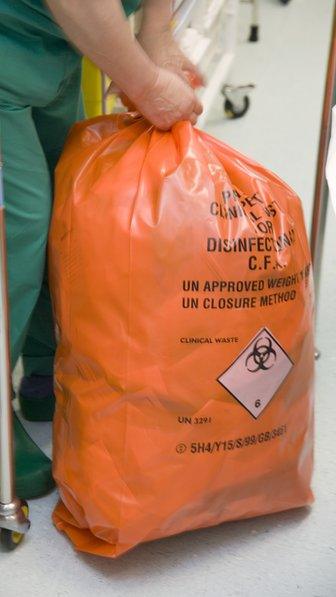NHS 'wasting millions on supplies'
- Published
- comments

The cost of clinical waste bags varies greatly
Ever wondered how much your local hospital pays for incontinence pads, medical wipes or surgical gloves?
I guess its not the sort of thing you want to think about for too long, if at all.
But it matters to everyone as taxpayers because potentially £25m of public money is being wasted every year.
That at least is the government's message.
Ministers argue that by better procurement, hospital managements could save money and reallocate it to front-line services.
The Department of Health has published data supplied by trust managements in England for the costs of 100 everyday items used in hospitals.
Major variations have been revealed.
To give a couple of examples:
A few hospital trusts were paying £9.60 for 100 clinical waste bags while others were paying £18.
And while one paid just 34p per face mask, a few were prepared to shell out £1.22 each.
Perhaps most worryingly, one trust was paying just over £20 for a pack of A4 paper while another was getting a deal at £4.49.
Each trust carries out its own procurement using an NHS catalogue of approved suppliers.
What these figures reveal is that some are trying a lot harder than others to strike a hard bargain with those suppliers.
If all of them forced down their prices even to the lowest quartile of the survey results, the savings would be at that £25m level.
Ministers hope that by naming and shaming trusts, the worst offenders will feel the pressure and start shopping around or playing hardball with suppliers.
The Department of Health intends to repeat the exercise later in the year with prices paid for 500 products and services including energy.
But should the trusts take all the blame? Isn't the most potent purchasing power in the heart of Whitehall and in the corridors of the Department of Health?
Economies of scale
Big is beautiful with the economics of procurement.
The public sector has been notoriously bad over the years at using its immense buying power to get the best deals for the taxpayer.
Retail boss Sir Philip Green was brought in to advise central government on procurement a few years ago.
It is not clear what benefits his intervention achieved.
If NHS England or the Department of Health negotiated on behalf of all parts of the health service for their purchasing requirements they would be able to hammer down suppliers more effectively. One deal for all might yield much better results.
The Department says its considering central procurement on a trial basis for 50 items.
This sounds bureaucratic but it is important.
With the NHS spending of about £100bn a year, savings can make a difference - especially if they appear easy to achieve just by getting smarter with procurement.